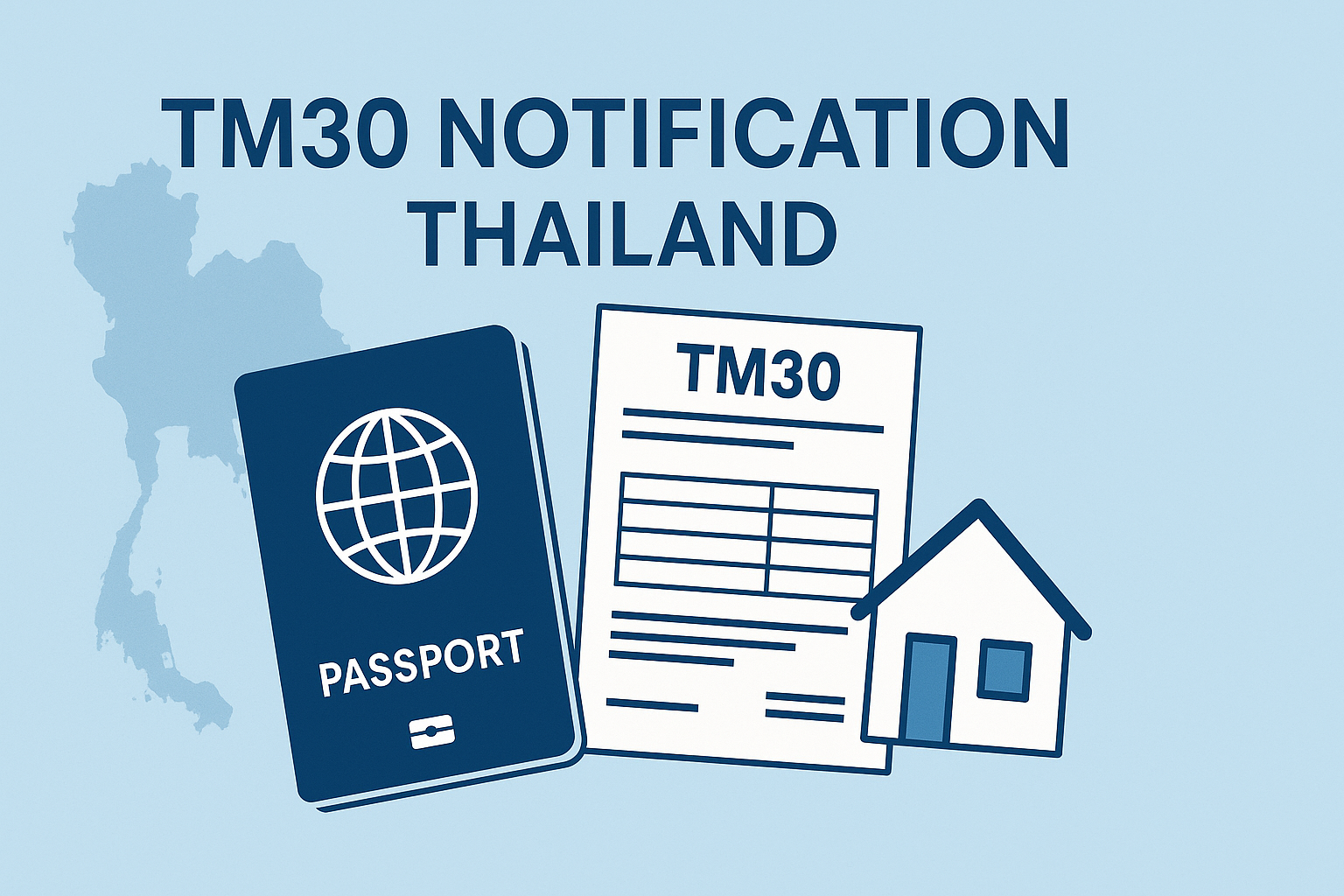If you are planning to stay in Thailand for any length of time you will probably come across the TM30 form. This form, officially called the “Notification from House-Master, Owner or the Possessor of the Residence where Alien has Stayed,” has become an important topic among expats and property owners. With Thai immigration now taking TM30 more seriously it is important for both landlords and foreigners to understand how it works.
What is the TM30 Notification?
The TM30 notification is a rule under Thailand’s Immigration Act that requires landlords, property owners or managers to report whenever a foreign national stays at their property. This must be done within 24 hours of the foreigner’s arrival. It applies to all types of accommodation whether it is a condo, apartment, hotel or private home. The rule is the same no matter if the owner is Thai or a foreigner.
Why Does TM30 Exist?
TM30 is all about keeping track of where foreigners are staying in Thailand. The government wants to know this for several reasons:
- To prevent people from overstaying their visas
- To help with crime prevention and public safety
- To keep accurate records of tourism and residency
While it may feel like extra paperwork the main goal is to make sure everyone is accounted for and to keep things running smoothly.
Who Needs to File the TM30?
- The landlord, property owner or manager is responsible for filing the TM30 not the foreign tenant.
- If you are a foreigner renting or staying somewhere you should check with your landlord to make sure the TM30 has been submitted. If it is not done you could run into problems with visa renewals or 90-day reporting.
- If you own your own property in Thailand you need to file the TM30 for yourself.
What Happens if TM30 is Not Filed?
If the TM30 notification is not submitted within 24 hours the landlord or property manager can be fined. The usual fine is between 800 and 2,000 Baht per person. Although the fine is for the property owner foreigners might face trouble with future visa applications or extensions if the TM30 is missing from the system.
When Do You Need to File a New TM30?
- When you arrive at a new address: Every time a foreigner moves to a new place in Thailand a TM30 must be filed within 24 hours.
- After traveling abroad: If you leave Thailand and come back even if you return to the same address a new TM30 notification is needed within 24 hours.
- When you change your address: If you move to a different residence the new landlord or owner must file a fresh TM30.
How to File the TM30 Notification
There are several ways to submit the TM30:
- In person: Visit your local immigration office with the required documents.
- Online: Use the official immigration portal tm30.immigration.go.th
- Mobile app: The “Section 38” app (available for iOS and Android in Thailand) can also be used to report.
What Documents Are Needed?
- For the foreigner:
- Copy of your passport (photo page)
- Copy of your visa page
- Copy of your departure card or just the number
- For the landlord:
- Copy of the property title deed
- Copy of the rental contract
- Copy of ID card or passport
If a property manager is taking care of this a letter of authorization may also be needed.
What Should Foreigners Do?
- Always check with your landlord or accommodation provider to make sure the TM30 has been filed.
- Keep your TM30 receipt (Return Slip) in a safe place. You might need it for visa extensions, 90-day reporting or even for insurance claims at the hospital.
- If you lose the receipt file a police report and show it to immigration to get a replacement.
If you find the process complicated, you can use a trusted service for a smooth, hassle-free experience. Just send the required documents by 11AM and pick up your TM30 Certificate at the office the same afternoon – no need to go to immigration.
- The TM30 online system was updated in September 2023 making it easier to use and more reliable.
- Foreigners no longer need to file TM28 reports for short trips to other provinces if their main address stays the same.
- When possible set your TM30 check-out date to cover your expected stay but always update it after international travel or moving to a new place.
Final Thoughts
TM30 is a key part of Thailand’s immigration rules. It may seem like a hassle at first but once you know what to do it is usually a quick process. Landlords and property managers should act quickly and foreigners should always double-check that their TM30 is up to date. This helps you avoid fines, visa problems and unnecessary headaches during your time in Thailand.
For the latest info and to file online visit the official TM30 portal https://tm30.immigration.go.th/
Keywords: TM30 Thailand, TM30 notification, Thai immigration, TM30 reporting, landlord responsibilities, foreigner residence Thailand, TM30 online system

